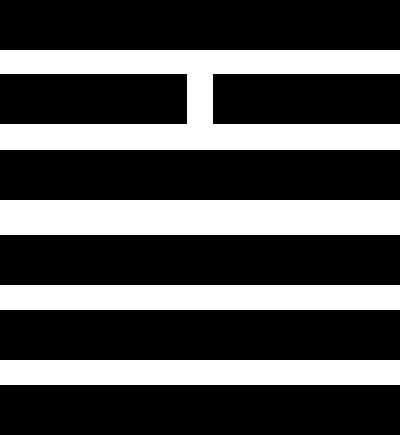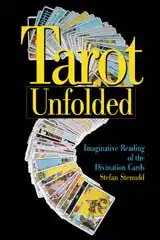
Upper trigram: Li The Clinging, Flame
Lower trigram: Ch'ien The Creative, Heaven
The Judgement
Possession in Great Measure.
Supreme success.
The Image
Fire in heaven above:
The image of Possession in Great Measure.
Thus the superior man curbs evil and furthers good,
And thereby obeys the benevolent will of heaven.
The Lines
These texts apply only for the lines that were marked, when the hexagram was cast. Note that the lines are counted from the bottom up.
The bottom line marked means:
No relationship with what is harmful;
There is no blame in this.
If one remains conscious of difficulty,
One remains without blame.
The 2nd line marked means:
A big wagon for loading.
One may undertake something.
No blame.
The 3rd line marked means:
A prince offers it to the Son of Heaven.
A petty man cannot do this.
The 4th line marked means:
He makes a difference
Between himself and his neighbor.
No blame.
The 5th line marked means:
He whose truth is accessible, yet dignified,
Has good fortune.
The top line marked means:
He is blessed by heaven.
Good fortune.
Nothing that does not further.
The interpretations above and comments below are from Richard Wilhelm's version of the I CHING.
Comments on the Hexagram
The fire in heaven above shines far, and all things stand out in the light and
become manifest. The weak fifth line occupies the place of honor and all the
strong lines are in accord with it.
All things come to the man who is modest and kind in a high position.
The Judgement
The two trigrams indicate that strength and clarity unite. Possessions great
measure is determined by fate and accords with the time. How is it possible
that the weak line has power to hold the strong lines fast and to possess
them? It is done by virtue of unselfish modesty. The time is favorable — a
time of strength within, clarity and culture without. Power is expressing itself
in graceful and controlled way. This brings supreme success and wealth.
The Image
The sun in heaven above, shedding light over everything one earth, is the
image of possession on a grand scale. But a possession of this sort must be
administered properly. The sun brings both evil and good into the light of
day. Man must combat and curb the evil, and must favor and promote the
good. Only in this way does he fulfill the benevolent will of God, who desires
only good and not evil.
The Lines
The bottom line marked
Great possession that is still in its beginnings and that has not yet been
challenged brings no blame, since there has been no opportunity to make
mistakes. Yet there are many difficulties to be overcome. It is only by
remaining conscious of theses difficulties that one can keep inwardly free of
possible arrogance and wastefulness, and thus in principle overcome all cause
for blame.
The 2nd line from the bottom marked
Great possession consists not only in the quantity of goods at one's disposal,
but first and foremost, in their mobility and utility, for then they can be used
in undertakings, and we remain free of embarrassment and mistakes. The big
wagon, which will carry a heavy load and in which one can journey farm
means that there are at hand able helpers who give their support t and are
equal to their task. One can load great responsibility upon such persons, and
this is necessary in important undertakings.
The 3rd line from the bottom marked
A magnanimous, liberal-minded man should not regard what he possesses as
his exclusive personal property, but should place it at the disposal of the ruler
or of the people at large. In so doing, he takes the right attitude toward his
possession, which as private property can never endure. A petty man is
incapable of this. He is harmed by great possessions, because instead of
sacrificing them, he would keep them for himself.
The 4th line from the bottom marked
This characterizes the position of a man placed among rich and powerful
neighbors. It is a dangerous position. He must look neither to the right nor
to the left, and must shun envy and the temptation to vie with others. In this
way he remains free of mistakes.
The 5th line from the bottom marked
The situation is very favorable. People are being won not by coercion but by
unaffected sincerity, so that they are attached to us in sincerity and truth.
However, benevolence alone is not sufficient at the time of POSSESSION IN
GREAT MEASURE. For insolence might begin to spread. Insolence must be
kept in bounds by dignity; then good fortune is assured.
The top line marked
In the fullness of possession and at the height of power, one remains modest
and gives honor to the sage who stands outside the affairs of the world. By
this means one puts oneself under the beneficent influence descending form
heaven, and all goes well. Confucius says of this line:
To bless means to help. Heaven helps the man who is devoted; men help the
man who is true. He who walks in truth and is devoted in his thinking, and
furthermore reveres the worthy, is blessed by heaven. He has good fortune,
and there is nothing that would not further.
Further Reading
Here I add some perspectives on this hexagram, as well as other methods to read its meaning, in additon to what Richard Wilhelm derives from it above.
Meaning of the Trigrams Combined
Each hexagram combines two trigrams, making one the upper and the other the lower. The meaning of the hexagram is mainly derived from that combination. Here's what it means for this hexagram:
Flame upon Heaven
This part of the text is being edited. It will be added shortly.
Compare to the Reversed Trigrams
It's common to compare a hexagram to the one where the lines are the opposite: a full line is broken and a broken line full. But I find it much more interesting to compare hexagrams with the trigrams reversed: the upper trigram becomes the lower, and the lower trigram becomes the upper. That deepens the understanding of the trigrams at work — when they're not identical. Click the image to see what it means for the two trigrams of this hexagram:

The hexagram with the trigrams reversed
Compare to the Reversed Lines
You can also compare this hexagram to its opposite according to the six lines, where each broken line is full, and vice versa. In some cases it leads to the same hexagram as the one where the trigrams are switched. Here is the hexagram with reversed lines (click it to get to its webpage):

Hexagram with opposite lines
Click the header to read more about the eight trigrams that are combined into the 64 hexagrams.
The 64 I Ching Hexagrams
An I Ching hexagram is composed of two trigrams. Each of the 64 hexagrams has its own name, meaning, and divinatory text. Here they all are, in the traditional order. Click on the image of an I Ching hexagram to get to its webpage.
Use the Facebook field on some of these web pages to comment the I Ching or this website.




































































